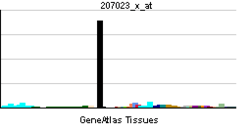Keratin 10
Keratin, type I cytoskeletal 10 also known as cytokeratin-10 (CK-10) or keratin-10 (K10) is a protein that in humans is encoded by the KRT10 gene.[3][4][5] Keratin 10 is a type I keratin.
Function
Keratin-10 is a member of the type I (acidic) cytokeratin family, which belongs to the superfamily of intermediate filament (IF) proteins. Keratins are heteropolymeric structural proteins which form the intermediate filament. These filaments, along with actin microfilaments and microtubules, compose the cytoskeleton of epithelial cells. Mutations in this gene are associated with epidermolytic hyperkeratosis. This gene is located within a cluster of keratin family members on chromosome 17q21.[5]
Interactions
Keratin 10 has been shown to interact with AKT1.[6]
See also
References
- ↑ "Human PubMed Reference:".
- ↑ "Mouse PubMed Reference:".
- ↑ Lessin SR, Huebner K, Isobe M, Croce CM, Steinert PM (Jan 1989). "Chromosomal mapping of human keratin genes: evidence of non-linkage". J Invest Dermatol. 91 (6): 572–8. doi:10.1111/1523-1747.ep12477087. PMID 2461420.
- ↑ Schweizer J, Bowden PE, Coulombe PA, Langbein L, Lane EB, Magin TM, Maltais L, Omary MB, Parry DA, Rogers MA, Wright MW (Jul 2006). "New consensus nomenclature for mammalian keratins". J Cell Biol. 174 (2): 169–74. doi:10.1083/jcb.200603161. PMC 2064177
 . PMID 16831889.
. PMID 16831889. - 1 2 "Entrez Gene: KRT10 keratin 10 (epidermolytic hyperkeratosis; keratosis palmaris et plantaris)".
- ↑ Paramio, J M; Segrelles C; Ruiz S; Jorcano J L (Nov 2001). "Inhibition of protein kinase B (PKB) and PKCzeta mediates keratin K10-induced cell cycle arrest". Mol. Cell. Biol. United States. 21 (21): 7449–59. doi:10.1128/MCB.21.21.7449-7459.2001. ISSN 0270-7306. PMC 99917
 . PMID 11585925.
. PMID 11585925.
Further reading
- Yang JM, Nam K, Kim SW, et al. (1999). "Arginine in the beginning of the 1A rod domain of the keratin 10 gene is the hot spot for the mutation in epidermolytic hyperkeratosis". J. Dermatol. Sci. 19 (2): 126–33. doi:10.1016/S0923-1811(98)00055-3. PMID 10098704.
- Rasmussen HH, van Damme J, Puype M, et al. (1993). "Microsequences of 145 proteins recorded in the two-dimensional gel protein database of normal human epidermal keratinocytes". Electrophoresis. 13 (12): 960–9. doi:10.1002/elps.11501301199. PMID 1286667.
- Korge BP, Gan SQ, McBride OW, et al. (1992). "Extensive size polymorphism of the human keratin 10 chain resides in the C-terminal V2 subdomain due to variable numbers and sizes of glycine loops". Proc. Natl. Acad. Sci. U.S.A. 89 (3): 910–4. doi:10.1073/pnas.89.3.910. PMC 48354
 . PMID 1371013.
. PMID 1371013.
- Tkachenko AV, Buchman VL, Bliskovsky VV, et al. (1992). "Exons I and VII of the gene (Ker10) encoding human keratin 10 undergo structural rearrangements within repeats". Gene. 116 (2): 245–51. doi:10.1016/0378-1119(92)90521-P. PMID 1378806.
- Rothnagel JA, Dominey AM, Dempsey LD, et al. (1992). "Mutations in the rod domains of keratins 1 and 10 in epidermolytic hyperkeratosis". Science. 257 (5073): 1128–30. doi:10.1126/science.257.5073.1128. PMID 1380725.
- Cheng J, Syder AJ, Yu QC, et al. (1992). "The genetic basis of epidermolytic hyperkeratosis: a disorder of differentiation-specific epidermal keratin genes". Cell. 70 (5): 811–9. doi:10.1016/0092-8674(92)90314-3. PMID 1381287.
- Dawson SJ, White LA (1992). "Treatment of Haemophilus aphrophilus endocarditis with ciprofloxacin". J. Infect. 24 (3): 317–20. doi:10.1016/S0163-4453(05)80037-4. PMID 1602151.
- Nazzaro V, Ermacora E, Santucci B, Caputo R (1990). "Epidermolytic hyperkeratosis: generalized form in children from parents with systematized linear form". Br. J. Dermatol. 122 (3): 417–22. doi:10.1111/j.1365-2133.1990.tb08292.x. PMID 2182100.
- Darmon MY, Sémat A, Darmon MC, Vasseur M (1988). "Sequence of a cDNA encoding human keratin No 10 selected according to structural homologies of keratins and their tissue-specific expression". Mol. Biol. Rep. 12 (4): 277–83. doi:10.1007/BF00444680. PMID 2448602.
- Zhou XM, Idler WW, Steven AC, et al. (1988). "The complete sequence of the human intermediate filament chain keratin 10. Subdomainal divisions and model for folding of end domain sequences". J. Biol. Chem. 263 (30): 15584–9. PMID 2459124.
- Rieger M, Franke WW (1989). "Identification of an orthologous mammalian cytokeratin gene. High degree of intron sequence conservation during evolution of human cytokeratin 10". J. Mol. Biol. 204 (4): 841–56. doi:10.1016/0022-2836(88)90045-9. PMID 2464696.
- van Dongen GA, Braakhuis BJ, Leyva A, et al. (1989). "Anti-tumor and differentiation-inducing activity of N,N-dimethylformamide (DMF) in head-and-neck cancer xenografts". Int. J. Cancer. 43 (2): 285–92. doi:10.1002/ijc.2910430221. PMID 2465278.
- Rogaev EI, Rogaeva EA, Ginter EK, et al. (1994). "Identification of the genetic locus for keratosis palmaris et plantaris on chromosome 17 near the RARA and keratin type I genes". Nat. Genet. 5 (2): 158–62. doi:10.1038/ng1093-158. PMID 7504553.
- Rothnagel JA, Longley MA, Holder RA, et al. (1994). "Prenatal diagnosis of epidermolytic hyperkeratosis by direct gene sequencing". J. Invest. Dermatol. 102 (1): 13–6. doi:10.1111/1523-1747.ep12371723. PMID 7507150.
- McLean WH, Eady RA, Dopping-Hepenstal PJ, et al. (1994). "Mutations in the rod 1A domain of keratins 1 and 10 in bullous congenital ichthyosiform erythroderma (BCIE)". J. Invest. Dermatol. 102 (1): 24–30. doi:10.1111/1523-1747.ep12371726. PMID 7507152.
- Chipev CC, Yang JM, DiGiovanna JJ, et al. (1994). "Preferential sites in keratin 10 that are mutated in epidermolytic hyperkeratosis". Am. J. Hum. Genet. 54 (2): 179–90. PMC 1918158
 . PMID 7508181.
. PMID 7508181.
- Rothnagel JA, Fisher MP, Axtell SM, et al. (1994). "A mutational hot spot in keratin 10 (KRT 10) in patients with epidermolytic hyperkeratosis". Hum. Mol. Genet. 2 (12): 2147–50. doi:10.1093/hmg/2.12.2147. PMID 7509230.
- Syder AJ, Yu QC, Paller AS, et al. (1994). "Genetic mutations in the K1 and K10 genes of patients with epidermolytic hyperkeratosis. Correlation between location and disease severity". J. Clin. Invest. 93 (4): 1533–42. doi:10.1172/JCI117132. PMC 294170
 . PMID 7512983.
. PMID 7512983.
- Huber M, Scaletta C, Benathan M, et al. (1994). "Abnormal keratin 1 and 10 cytoskeleton in cultured keratinocytes from epidermolytic hyperkeratosis caused by keratin 10 mutations". J. Invest. Dermatol. 102 (5): 691–4. doi:10.1111/1523-1747.ep12374270. PMID 7513736.
|
|---|
|
| Human | |
|---|
|
| Nonhuman | |
|---|
|
See also: cytoskeletal defects |



 . PMID 16831889.
. PMID 16831889. . PMID 11585925.
. PMID 11585925. . PMID 1371013.
. PMID 1371013. . PMID 7508181.
. PMID 7508181. . PMID 7512983.
. PMID 7512983.